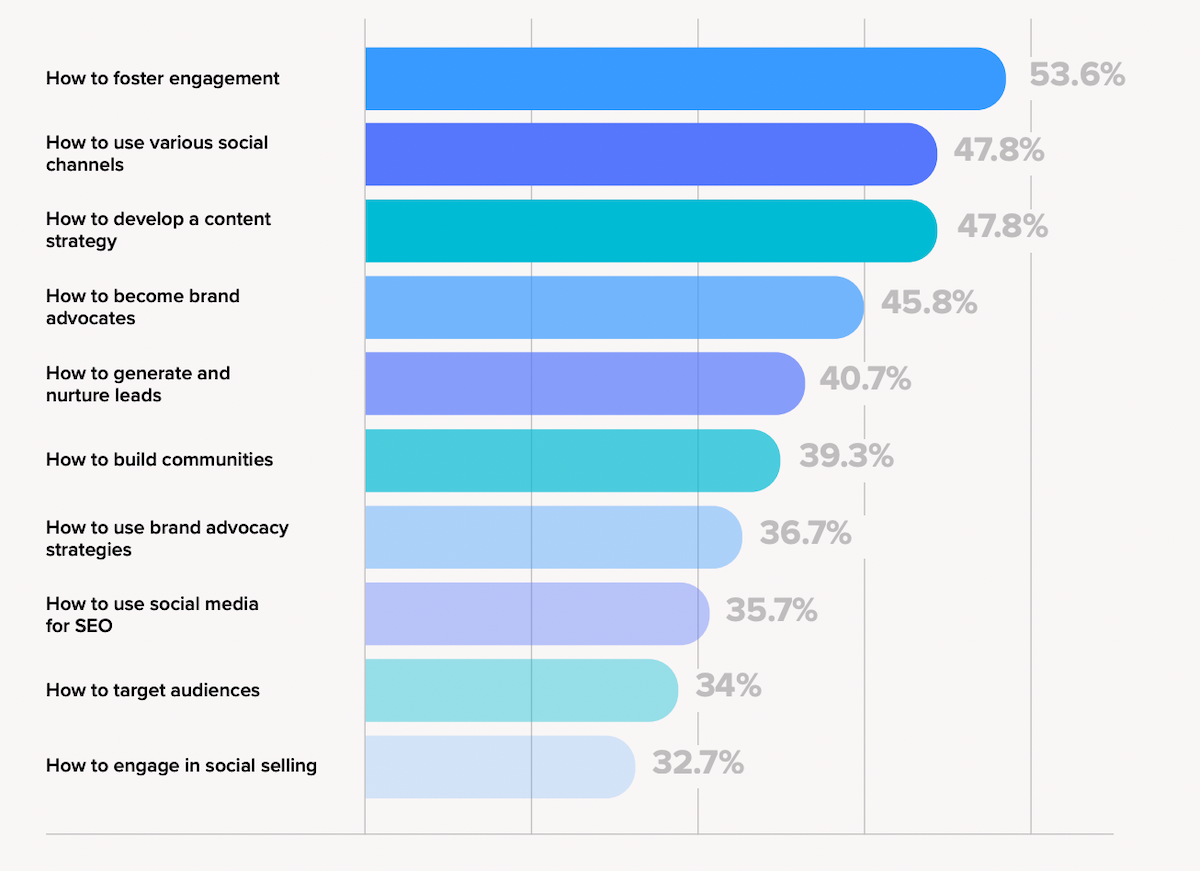Every employee can be an influencer because everyone has a network — whether it’s 100 people, 1,000, or more.
However, many employees are hesitant to get involved in their companies’ advocacy programs and post about their employer online because they suffer from imposter syndrome. Specifically, social media imposter syndrome.
In fact, 70% of people report experiencing imposter syndrome at some point during their careers.
What is Social Media Imposter Syndrome?
You’ve likely heard the term “imposter syndrome” tossed around in the workplace before. It refers to the psychological occurrence in which a person doubts their skills, talents, or abilities despite their education, experience, and accomplishments.
It’s essentially a fear that you’re not good or talented enough and your peers are about to realize it.
These feelings of inadequacy were first described by researchers Pauline Clance and Suzanne Imes in the 1970s.
Social media can easily play a role in imposter syndrome because we simply have to log on to LinkedIn or Instagram to see a list of people’s impressive achievements, their perfect photos, or their insightful, clever content that’s garnering tons of engagement.
When we’re inundated with our colleagues’ and peers’ accomplishments and social media savvy, we can’t help but compare ourselves to them. And it’s far too easy to believe that you’re only as valuable as the number of followers you have.
Plus, in today’s fast-paced, digital world, there’s always something new to learn or another trend to keep up with, so it’s difficult not to feel inadequate.
It’s understandably intimidating to put ourselves out there on social channels — even if our workplace encourages it. Even experienced social media marketers can suffer from social media imposter syndrome.
And when we’re accomplished elsewhere in our careers but brand new to social media, we can still experience imposter syndrome because it’s easy to expect ourselves to be high-achieving in all aspects of our jobs.
How to Help Employees Overcome Social Media Imposter Syndrome
There are countless benefits to activating your employee influencers — both for the company and your people.
You already know that though, which is why you’re here, so let’s take a look at the steps you can take to help your people conquer social media imposter syndrome and actively create and share content with their networks.
1. Normalize imposter syndrome.
Explain what imposter syndrome is and how common it is to feel like a fraud or be intimidated by social media so that employees don’t feel alone in these feelings.
You can also provide training in resources on how to overcome imposter syndrome.
Activate Your Team to Share and Create Content on Social Media 🚀
Give your company a competitive edge and your team a professional boost. Try EveryoneSocial's employee advocacy platform for FREE.
2. Make social media part of company culture.
It’s important not to mandate employee social media participation.
You want your people posting about the company to expand the reach of your messaging, improve your employer brand, and help attract top talent, but to do that, employees need to be authentic in their posts and interactions online.
They also need to feel comfortable posting and engaging on social media.
And one of the most important steps to achieving that is integrating social media into the company culture.
This begins during onboarding and can be sustained through such steps as sharing employee stories and encouraging participation in employee branding activities.
3. Foster psychological safety.
Posting on social media can be intimidating, especially if people are new to it or they haven’t worked for an organization that actually wants them to post about the company.
After all, it wasn’t that long ago that companies discouraged the use of social media in the workplace.
So if you want employees to participate in your advocacy program and be active online, you need to ensure they feel comfortable doing so. In other words, you need to foster psychological safety so that your people feel safe sharing their ideas and asking questions.
This won’t only create an environment where workers are more likely to take on the important role of employee influencers, but it’ll have other benefits as well.
In fact, research shows that company cultures that foster psychological safety experience a 56% increase in productivity and a 50% decrease in the risk of employee turnover.
4. Provide social media rules and training.
When you give your people the tools they need to succeed as employee influencers, it’ll help thwart social media imposter syndrome from the get-go.
This begins by going over the company’s social media policy — something that’s essential in the modern workplace.
Next, provide social media training, which includes everything from how to use social networks and optimize LinkedIn profiles to what to post and how to utilize social channels for business.
Shockingly, 75% of employees don’t receive social media training at work, but people do want to learn these skills.

The above slide from our 2022 Employee Influencer Impact Report details exactly what people wish their employers would cover in such training sessions.
5. Encourage practice.
We’ve all heard the adages “Practice makes perfect” and “Fake it until you make it” and there’s certainly truth to these when it comes to overcoming social media imposter syndrome.
So make it clear to employees that no one is going to excel at something when they first start out. They can learn social media skills on the job just like they learned other ones.
Encourage them to post on the social channels they’re comfortable with, experiment with new ones, try out different types of content, and take risks. After all, it’s all about practice — not instant success.
And if your people need a little help figuring out what to post, try out these social media prompts.
6. Recognize efforts — not just achievements.
It’s important to congratulate employees on a job well done, but don’t just praise the people whose social posts garner the most clicks and shares.
Recognize those who are new to your employee influencer program, highlight creative or insightful posts that might have gone overlooked, and thank employees for sharing content.
You can do this privately during employee reviews or via a simple Slack message or DM, or you can make it public by featuring employee social posts in the company newsletter. (BTW, EveryoneSocial has the ideal feature for this.)
A little positive reinforcement and recognition goes a long way to employee advocacy success. In fact, research by psychologist Carol Dweck proves that praising effort instead of accomplishments alone is one of the most effective ways to combat imposter syndrome.
EveryoneSocial is Designed to Get Employees Posting
Another great way to beat social media imposter syndrome? Make participation in your employee influencer program easy, fun, and rewarding.
Our pure play advocacy solution has countless features to do exactly that, including content curation so employees know what to post, numerous platform integrations, gamification features to get people sharing, and more.
















